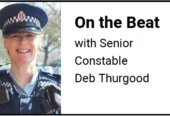
I hope everyone has had a great Easter weekend and was fortunate enough to get some time off to recharge, as I did. This week, I have a reminder for all following a recent situation experienced by our team.
Whether you are walking, cycling or driving and come across a police cordon, you must not pass. This police cordon may take the form of police emergency tape closing off a pathway/area, it may be a static police car in a clear position blocking a road or an actual police Officer standing guard. Put simply, the cordon is there for a reason – and it’s always an important one.
Public safety is an overriding concern.
Primarily however, the cordon will usually be in place to protect the evidential integrity of a crime scene, to contain an offender or to minimise path contamination when a police dog is actively tracking. It becomes more sensitive however when the cordon is in place to preserve the dignity and privacy of a (sometimes critically) injured person, whilst enabling emergency services to attend to their needs. It is disappointing for attending police in this last scenario, when members of the public actively remove a tape cordon, or argue the point with a police officer as to why their personal need, overrides the cordon. Please don’t be that person. We will not always be able to tell you the exact reason why we can’t let you pass, but nevertheless, trust that it is essential that you don’t and we will lift the cordon as soon as the requirement has ended.
When it comes to traffic crashes, cordons and/or traffic control will often be in place. The speed limit when passing a crash scene drops to 20kph. Failing to observe this not only risks you getting a fine, but can cause related crashes (most commonly nose-to-tails) where one car slows and the one behind doesn’t. Frequently we also see ‘rubber necking’ when occupants of cars hinder the flow of traffic while peering voyeuristically at the crash scene. What is worse, is when the cell phones come out and videos or photos are taken and shared on social media. Please consider how you would feel if photos of a serious crash in which your family member or friend was involved, were plastered all over local social media, potentially before you had even been officially informed.
Anyone police see using a cell phone while driving will receive a fine of $150 and 20 demerits.
One last note on crash prevention is around stop signs. Stop signs are in place at intersections where there is a higher risk of crashing, for example where roads with differing speed limits intersect, or where for other reasons it is deemed a high crash area.
Remember, stop means stop.








